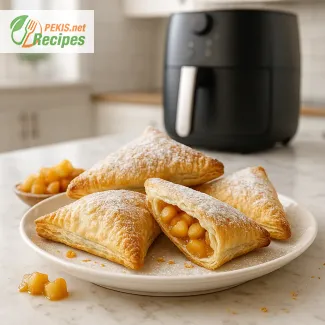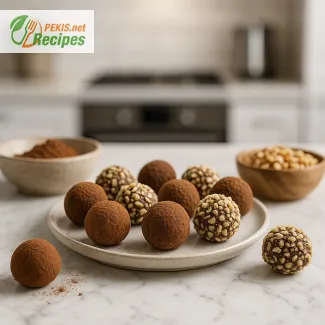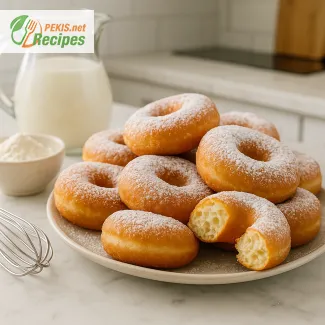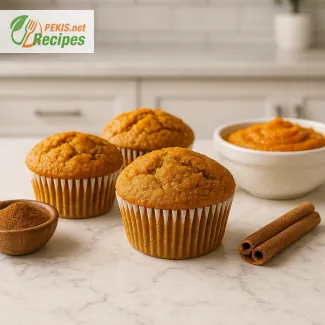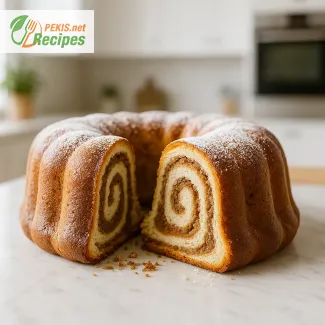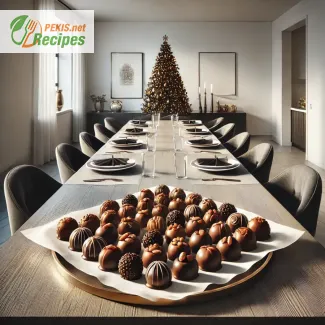
The holiday season is a time of joy, warmth, and the irresistible aroma of sweet treats wafting through the air. Among the classic indulgences, Christmas pralines stand out as a festive favorite—a perfect blend of rich flavors, smooth textures, and a touch of seasonal magic. These little bites of perfection not only bring a touch of elegance to any dessert table but also embody the spirit of the holidays in every single bite.
Making Christmas pralines is more than just a culinary endeavor; it’s a tradition that sparks joy, creativity, and togetherness. Crafted with love, these treats combine buttery caramel, roasted nuts, and delicate chocolate to create a symphony of flavors that melt in your mouth. Whether you’re a seasoned pastry chef or a home cook looking to impress your guests, pralines offer the perfect canvas to express your holiday cheer.
The beauty of homemade pralines lies in their versatility. With simple ingredients like sugar, cream, and chopped nuts, you can create something extraordinary. While the recipe remains timeless, it allows room for personal touches—perhaps a pinch of cinnamon for warmth, a splash of vanilla for depth, or a drizzle of melted chocolate for that extra layer of indulgence. For those who want to cater to dietary restrictions, pralines can easily be adapted to include gluten-free or dairy-free alternatives without compromising on flavor.
The process of crafting these delightful morsels is as satisfying as the end result. Picture this: sugar bubbling gently in a saucepan, transforming into a golden caramel as its sweet aroma fills your kitchen. Roasting nuts to a perfect crispness enhances their natural flavors, adding a crunch that contrasts beautifully with the soft caramel. The final step, enrobing these treasures in a velvety layer of chocolate, is where the magic truly happens. The result? Luxurious, handcrafted pralines that are as beautiful as they are delicious.
Christmas pralines aren’t just desserts; they’re gifts of love. Wrapped in festive packaging, they make thoughtful presents for friends, family, or even your holiday party host. Their elegant appearance and heavenly taste leave a lasting impression, making them a cherished tradition year after year.
In addition to their delectable taste, pralines carry the added bonus of being a relatively simple yet impressive treat to prepare. Whether served at the end of a holiday feast, alongside a cup of coffee by the fire, or included in a dessert platter, they’re sure to steal the spotlight.
Moreover, pralines are a feast for the senses. The glossy chocolate coating tempts the eyes, the roasted nuts offer a satisfying crunch, and the caramel delivers a sweetness that lingers on the palate. Combined, these elements create a dessert that feels luxurious yet comforting—a true celebration of the season.
For those who love to experiment, pralines can be enhanced with modern twists. Consider adding sea salt to the caramel for a sweet-and-salty contrast or infusing the chocolate with orange zest for a citrusy kick. You might even shape them into festive forms like stars or snowflakes to add a whimsical touch to your holiday spread.
When it comes to presentation, the possibilities are endless. Arrange your pralines in a decorative box, sprinkle them with edible glitter, or serve them alongside other festive treats like gingerbread cookies and fruitcake. Their versatility ensures they’ll complement any holiday dessert lineup.
Incorporating Christmas pralines into your holiday traditions guarantees a dessert that’s both elegant and comforting. From their enticing aroma during preparation to the smiles they bring to your loved ones, these treats are the perfect way to celebrate the most wonderful time of the year.
So why not embark on a journey to create your own batch of Christmas pralines? Gather your ingredients, channel your creativity, and let the spirit of the holidays inspire you. With a bit of patience and a dash of festive cheer, you’ll have a dessert that captures the magic of the season in every bite.
1. Prepare the Nuts
- Roast the nuts at 180°C (350°F) for 10 minutes or until golden brown. Let them cool and chop roughly for added texture.
2. Make the Caramel
- In a heavy-bottomed saucepan, heat the sugar over medium heat until fully melted and golden. Stir gently to avoid crystallization.
- Reduce heat and slowly whisk in the cream. Be cautious, as the mixture will bubble vigorously.
- Add the butter and stir until smooth. Optionally, add sea salt for a salted caramel flavor. Remove from heat and allow it to cool slightly.
3. Combine Caramel and Nuts
- Stir the roasted nuts into the caramel until evenly coated. Using a spoon, drop small clusters onto a parchment-lined tray. Let them set for 10 minutes.
4. Prepare the Chocolate Coating
- Melt the dark chocolate over a double boiler or in the microwave (30-second intervals). Stir until smooth.
5. Coat the Pralines
- Dip each nut cluster into the melted chocolate, ensuring even coverage. Place them back on the parchment-lined tray.
6. Set and Serve
- Let the pralines set at room temperature or in the refrigerator for 15 minutes. Once the chocolate hardens, they are ready to serve.
Tips and Variations for Perfecting Your Christmas Pralines
Creating the perfect Christmas pralines is an art form that allows for endless customization. The beauty of this recipe lies in its simplicity, yet with a few thoughtful adjustments to the ingredients, you can craft pralines that cater to a variety of preferences, dietary restrictions, and flavor profiles. Below, we explore how changes to the recipe impact the taste, texture, and overall presentation, ensuring your pralines are always a hit.
1. Nuts: The Foundation of Flavor and Texture
Nuts play a central role in pralines, offering a rich, roasted flavor and delightful crunch. Changing the type of nuts can dramatically alter the pralines' taste and texture:
- Hazelnuts: Deliver a naturally sweet and creamy flavor, pairing perfectly with dark chocolate for a luxurious praline.
- Pecans: Add a buttery and earthy note, creating a more traditional praline often enjoyed in classic holiday recipes.
- Almonds: Offer a firm crunch and subtle nuttiness, perfect for those who prefer a milder flavor.
- Walnuts: Provide a slightly bitter edge, balancing the sweetness of the caramel.
- Tip: For a unique twist, consider mixing nuts or incorporating exotic varieties like macadamias for a buttery finish.
2. Sweeteners: Balancing Caramel’s Richness
The sugar used in this recipe is crucial for forming the caramel. However, substitutions can adjust the sweetness level and flavor:
- Brown sugar: Adds a molasses depth, creating a richer, more complex caramel.
- Coconut sugar: Provides a subtle caramel flavor with less sweetness and a lower glycemic index.
- Maple syrup or honey: Can replace granulated sugar for a softer caramel with unique flavor notes but may require adjusting the cooking time to prevent over-browning.
3. Chocolate: A Personal Choice
The type of chocolate used for coating significantly influences the pralines’ flavor:
- Dark chocolate (70% or more): Adds a sophisticated, slightly bitter profile, balancing the sweetness of the caramel.
- Milk chocolate: Creates a sweeter and creamier praline, ideal for those who enjoy a more indulgent treat.
- White chocolate: Offers a buttery, vanilla-forward flavor but may require careful tempering to achieve a smooth coating.
- Tip: Experiment with flavored chocolates, such as orange-infused or spiced varieties, to add a festive twist.
4. Dairy Alternatives: Adjusting for Dietary Preferences
If you're looking to make the recipe dairy-free or vegan, consider these substitutions:
- Coconut cream: Replaces heavy cream, adding a tropical undertone while maintaining the richness of the caramel.
- Plant-based butter or margarine: Works well in place of unsalted butter, though it may slightly alter the flavor.
These substitutions result in pralines with a slightly lighter taste and texture, making them suitable for a wider audience.
5. Flavor Enhancements: Subtle Adjustments for a Unique Twist
A few additional ingredients can elevate the pralines and make them your signature holiday dessert:
- Sea salt: A pinch added to the caramel creates a salted caramel praline, enhancing the complexity of flavors.
- Vanilla extract: Deepens the flavor of the caramel and complements the roasted nuts.
- Cinnamon or nutmeg: (Optional) Adds warmth and spice, giving the pralines a festive flavor profile.
- Liqueurs: A splash of Grand Marnier, Amaretto, or Baileys adds a grown-up twist and pairs beautifully with the chocolate coating.
6. Dietary Adaptations: Meeting Specific Needs
To cater to dietary restrictions, make these adjustments:
- Gluten-free option: Use certified gluten-free chocolate to ensure no cross-contamination.
- Sugar-free option: Replace granulated sugar with a sugar substitute like erythritol, but note that the caramel texture may vary slightly.
- Nut-free version: Substitute nuts with seeds like pumpkin or sunflower for an allergy-friendly option. This results in a slightly softer praline but maintains the overall flavor profile.
7. Presentation and Texture: How Modifications Impact Appearance
The way pralines are finished also affects the sensory experience:
- Texture: Leaving nuts coarsely chopped adds crunch, while finely chopping or grinding them creates a smoother praline.
- Appearance: Drizzling pralines with contrasting chocolate (e.g., white chocolate over dark) adds visual appeal.
For an elevated presentation, dust pralines lightly with cocoa powder or edible gold dust.
8. Storage and Serving Tips
- Storage: Store pralines in an airtight container at room temperature for up to a week or in the fridge for up to two weeks. Freezing is possible but may slightly alter the texture of the chocolate coating.
- Serving: Allow refrigerated pralines to come to room temperature before serving to enhance the flavor and texture.
9. Sustainability and Ethical Considerations
- Ethical chocolate: Opt for fair-trade chocolate to ensure ethical sourcing and support sustainable practices.
- Local ingredients: Use locally sourced nuts and dairy for freshness and environmental sustainability.
10. Creating Variations for Other Occasions
While this recipe is ideal for Christmas, slight modifications can make pralines suitable for other celebrations:
- Easter: Shape pralines into eggs and decorate with pastel-colored chocolate.
- Valentine’s Day: Use heart molds and infuse the caramel with rose or raspberry essence.
- Halloween: Add orange-colored chocolate drizzle or black sesame seeds for a spooky effect.
The versatility of Christmas pralines means they can be tailored to suit any palate, occasion, or dietary preference. From adjusting the type of nuts to experimenting with different chocolates and sweeteners, every modification offers an opportunity to create a truly personalized dessert. These tips not only help you refine the recipe but also make it a memorable addition to your holiday traditions, year after year.
- Allergens: Contains nuts, dairy, and chocolate. May contain traces of gluten if cross-contaminated ingredients are used.
- Gluten-free Tips: Use certified gluten-free chocolate.
- Dairy-free Tips: Substitute heavy cream with coconut cream and butter with vegan margarine or coconut oil.
- Vitamin E: Found in nuts; supports skin health and immunity.
- Magnesium: Found in chocolate and nuts; promotes muscle and nerve function.
- Iron: Present in dark chocolate; aids in oxygen transportation.
- Vitamin B2: In nuts; supports energy production.
- Flavonoids: Found in dark chocolate; reduce inflammation and improve heart health.
- Polyphenols: In roasted nuts; combat oxidative stress.
- Vitamin C: (small amounts in some nuts) boosts immunity and skin health.
Enjoy the festive charm of these Christmas pralines, a perfect blend of flavors and textures!
